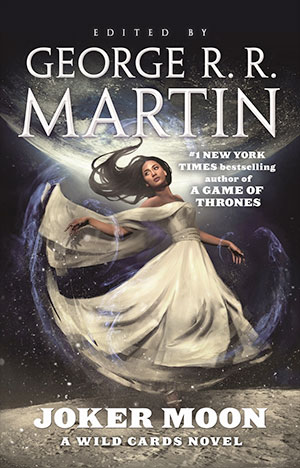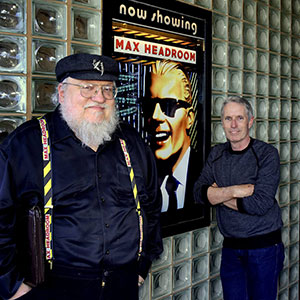July 14, 2021 — What do the 52 cards in a standard deck and 52 years since the first moon landing have in common with "A Game of Thrones" author George R.R. Martin? A new book in the "Wild Cards" anthology series.
Released by Tor Books two weeks before the Apollo 11 anniversary, "Joker Moon" turns the focus of the 30-volume alternate history to outer space.
"'Joker Moon' is the first book that is devoted to human — ace, joker and nat — obsession with, and plans for, and goals for, and wishes for expansion beyond Earth," Michael Cassutt, one of the 10 writers who contributed to the Martin-edited book, said in an interview with collectSPACE. "Probably the longest standalone story in the book, the one I wrote — 'Have Spaceship, Will Travel' — is a sequel to the original story about the moon landing published [in 'Deuces Down'] in 2002."
"Beyond that, there may have only been one or two other stories that have ever dealt directly with this this theme of space history, so most of the space stuff in Wild Cards is in 'Joker Moon,'" said Cassutt, who in addition to his "Wild Cards" credits, is a television producer and author of several non-fiction books about space history, including the biographies of astronauts Deke Slayton and Thomas Stafford, as well as NASA manager George Abbey.
In the context of the Wild Cards universe, before the space race could begin, an alien virus was released into the atmosphere that spread over the globe, having a profound effect on human beings as they outwardly appear and how they evolve.
"Of those the virus didn't kill, 90 percent were transformed into something hideous, something not human. Those became known as 'jokers.' The remaining ten percent who were affected, but didn't become jokers, frequently had a beneficial mutation. They present as ordinary humans as we know them, but they often have a power — Superman-style powers and other things. They are known as 'aces,'" explained Cassutt.
"There are also people who are 'nats,' people like you and me," he said. "So, it becomes an alternate history from 1946, some of which has echoes of our world, some of which is wildly different."
The U.S. and Soviet space programs still emerge, but with the knowledge that hostile aliens exist.
"Yes, there was a von Braun, there was a Korolyov, but they were dealing with the knowledge that there is technology far beyond anything the human race could duplicate," said Cassutt. "In fact, von Braun's people wound up working with a captured alien ship for awhile, trying to reverse engineer some of the technology, some of which they actually accomplish."
By the time that the 1960s come along, some of the alien technologies have been integrated into our launch vehicles, or we have retrofitted their spacecraft.
"For example, the first flight to the moon in 1968 was achieved by three amateurs using basically a repurposed alien spacecraft," Cassutt said.
"Joker Moon" is set in present day and largely centers on the activities of jokers and aces, but there are nods to the past, both in reality and in the context of the Wild Cards alternate history.
"Especially my story," said Cassutt. "It's about the next flight to the moon because humans, after going in 1968 in a very offhand, amateurish manner, never found a particular reason to do it again. They were too busy concentrating on space weapons and looking beyond the moon," he said. "So this is a return to the moon, and in some sense you get the story of what the Soviets do on the moon."
As in reality where commercial spaceflight is now coming into its own, the primary action in "Joker Moon" is driven by a well-funded private interest.
"The ultimate narrative is about a talented — and you'll love this Branson, Bezos and Musk fans — a very rich joker who has his own plans for the moon. So it is all about seeing him at the start of his activity," said Cassutt.
Prior to the release of "Joker Moon," Cassutt penned a short story about how our space history fits into the Wild Cards world. And by "our," we mean specifically what became of a certain collectSPACE editor. In "Stolen Space," published on the Wild Cards Consortium website, Robert Pearlman is a spaceflight enthusiast with an ace.
"If you go read 'Stolen Space' online, I think that would be a first step or a zero step toward deciding whether you want to invest in whole book that deals with how, and in what weird, strange ways spaceflight might evolve in the Wild Cards universe," said Cassutt. |
|

In "Joker Moon," edited by George R.R. Martin, the long-running "Wild Cards" series turns its focus outwards to space. (Tor Books)

"Wild Cards" creator and editor George R.R. Martin (left) and series contributor Michael Cassutt. (Michael Cassutt)

"Stolen Space" by Michael Cassutt for the "Wild Cards" website profiles a space enthusiast with an ace. (Wild Cards Consortium) |
